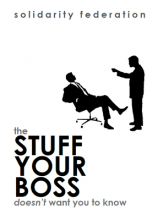Catalyst at Weston Favel
Members of Northampton Solfed spent some of their Saturday morning handing out copies of Catalyst at the Weston Favel Shopping Centre, until security staff moved them on. (Yet again we find that 'public' places are no such thing.)
More distribution is planned for next Saturday. Any one interested in helping out, or who would like some copies to distribute in their own area should contact us.




